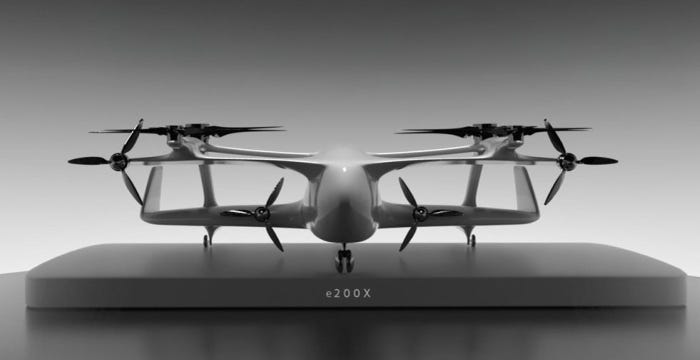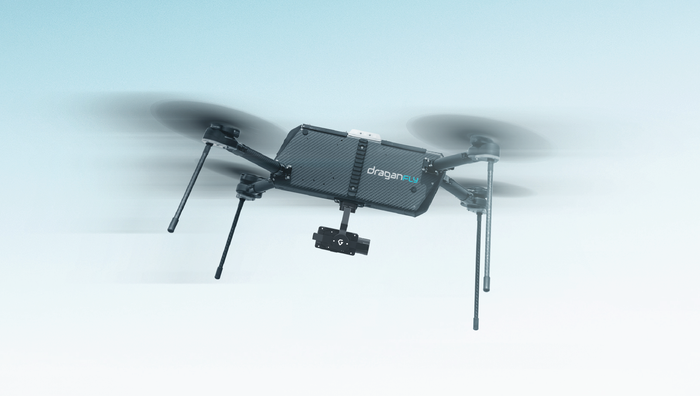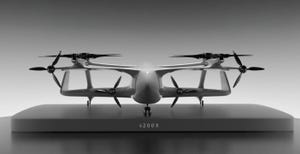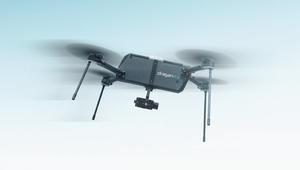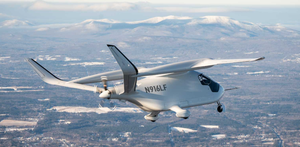Flying Taxi Company Selling 20 Vehicles for Air Medical OperationsFlying Taxi Company Selling 20 Vehicles for Air Medical Operations
The order came from Metro Aviation, an air medical operator that operates in 27 states and operates 170 aircraft
Air taxi developer Beta Technologies in Burlington, Vermont, has received an order for 20 of its electric aerial vehicles (EAV) to be used for air medical operations.
The order came from Metro Aviation, an air medical operator that operates in 27 states and operates 170 aircraft.
Metro plans to integrate the Alia eVTOL (electric vertical takeoff and landing) vehicles into its fleet to increase access to rural and urban areas and to provide inter-hospital and scene transport, according to the company.
“We originally designed Alia with organ and tissue transport in mind, so we are excited to complement that mission with Metro and its family of health care providers across the country,” said Kyle Clark, Beta founder and CEO. “Electric aviation brings reliability at a lower cost, which makes it a strong value proposition for urgent transport like hospital transfers and emergency response.”
The lower operational costs and increased utility are expected to allow eVTOL vehicles to offer better transport opportunities than current medical transportation methods.
Beta recently provided an early look at the passenger version of its fixed-wing VTOL (vertical takeoff and landing) Alia. Beta is also developing an eVTOL version.
The EAV is designed to carry five passengers and a pilot as well as carry-on luggage.
For more flying vehicle and other embedded tech news subscribe to our free newsletter!
The passenger version of the EAV is expected to launch after the Beta cargo and medical versions, targeted for 2025.
Beta recently raised $318 million in a series C equity round, bringing the total raised to more than $1 billion.
The funding was led by QIA, one of Beta’s largest investors, along with Fidelity Management and Research Company, TPG Rise Climate and United Therapeutics.
The new funding is aimed at propelling certification of the Beta Alia EAV and electric motors and supporting the ramp-up of production and delivery of flying vehicles and chargers, according to the company.
The passenger-carrying EAV would be used for intra-city and regional transportation.
Beta recently added electric charging stations for ground and EAVs at Tallahassee International Airport, Gainesville Regional Airport and Bob Sikes Airport.
Beta has added more than 35 charging stations along the east, west and gulf coasts with each Florida installation including a level three fast charger located inside the fence, known as airside, for use by EAVs and electric airport ground vehicles, and a level two charger outside the fence, known as landside, for ground EVs.
Beta chargers have been purchased by Archer Aviation, Atlantic Aviation, Signature Aviation, AvFlight, and the Department of Defense.
Beta is also installing charging stations outside Florida in partnership with airports and other partners across the U.S.
Beta recently won a $20 million federal contract with the U.S. Department of Health and Human Services Administration for Strategic Preparedness and Response to install EAV chargers in rural areas along the east and gulf coasts.
The contract would allow Beta to build charging stations to enable an emergency preparedness platform for the federal department to establish a cost-effective network to deliver equipment, pharmaceuticals and patients, even in remote areas.
Beta’s chargers are designed to support its own EAVs and others, along with ground electric vehicles.
Beta recently received a $2.6 million grant from the state of Michigan to help scale advanced air mobility (AAM) which came via Michigan’s AAM Activation Fund to create a centralized pipeline of projects to drive AAM growth in the state.
Late last year, Beta was granted $20 million from the Clinton County from Empire State Development’s Regional Economic and Community Assistance Program in New York- to expand its operations at Plattsburgh International Airport.
The new facility is intended to become the manufacturing and final assembly hub for Beta’s EAV and to create a permanent flight test and delivery center, for final flight testing, vehicle painting and customer delivery.
In addition to the new order from Metro Aviation, Beta has orders for its flying vehicles from UPS, United Therapeutics, which is also an investor, and Bristow and has contracts with the U.S. Air Force and Army.
Blade ordered up to 20 of Beta EAV in 2021 and LCI has announced it will be using Beta flying vehicles to move guests at the Aria Hotels in Greece. Helijet has placed an order for four eVTOLs for cargo and passenger missions.
Beta also was approved for a $169 million loan to finance its net-zero final assembly production facility from the Export-Import Bank of the United States.
The 188,500 square foot manufacturing facility opened in 2023 at the Patrick Leahy Burlington International Airport, where Beta plans to build its eVTOL and CTOL (conventional takeoff and landing) vehicles.
The new production facility, on a 40-acre site at the airport, could ultimately produce 300 EAVs a year, according to the company.
Beta has partnered with AFWERX, the innovation arm of the U.S. Air Force that leverages the Air Force Research Laboratory for this program.
Beta installed aircraft electric charging stations at Eglin Air Force Base to service the electric flying vehicles there. Beta’s eVTOL aircraft is planned for service in 2025 with its vertical version in service the following year.
Many EAVs are eVTOLs, which do not require traditional runways, since they take off and land straight up and down.
Vertiport facilities to manage the takeoff, landing, charging and maintenance of such vehicles are being established by companies such as Florida-based Aeroauto Global, which is also developing retail showrooms for flying vehicle sales.
Read more about:
Flying CarsAbout the Author
You May Also Like



